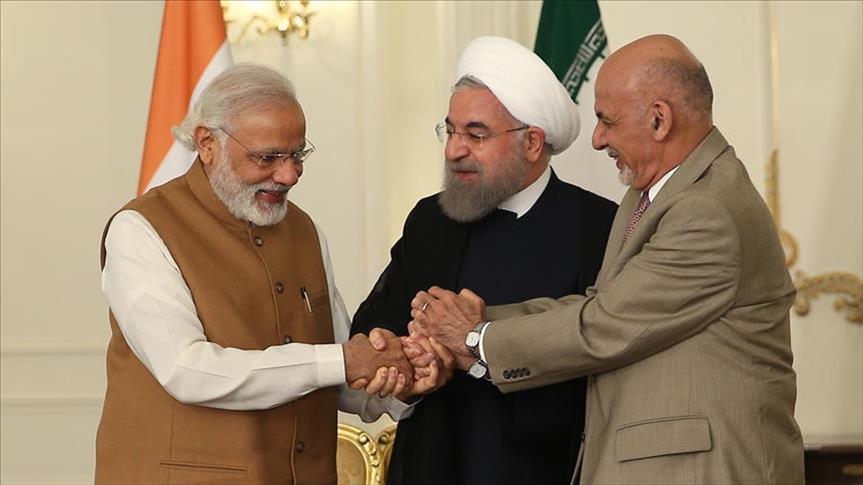Budding India-Afghan ties disconcert Pakistan
Islamabad is increasingly concerned about budding economic and defense cooperation between arch-rival India and Afghanistan
 President of Afghanistan Ashraf Ghani (R), Prime Minister of India Narendra Modi (L) and President of Iran Hassan Rouhani (C) shake hands after they signed Chabahar transit agreement in Tehran
President of Afghanistan Ashraf Ghani (R), Prime Minister of India Narendra Modi (L) and President of Iran Hassan Rouhani (C) shake hands after they signed Chabahar transit agreement in Tehran
India
By Mubasshir Mushtaq and Aamir Latif
MUMBAI/ISLAMABAD
Indian Prime Minister Narendra Modi last week inaugurated a $290-million "friendship dam" in Afghanistan in a move that has raised concern in Pakistan about the budding India-Afghanistan relationship.
"India will not forget you or turn away," Modi said at the inaugural ceremony in Afghanistan.
"Your friendship is our honor; your dreams are our duty," he told the people of Afghanistan in a live speech telecast from Herat.
Indian reconstruction efforts in war-ravaged Afghanistan have also included a new Afghan parliament building inaugurated last December at a cost of $90 million, a project that first began in 2009.
"At a time when western powers are discussing ways to increase the security apparatus of Afghanistan, India is perhaps the only country which is taking concrete measures in rebuilding Afghanistan," retired professor and South Asia expert Mustafa Khan told Anadolu Agency.
The India-Afghanistan "friendship dam" is intended to irrigate the fields of some 640 Afghan villages and bring electricity to 250,000 homes in and around Herat.
Khan said Indian reconstruction efforts in Afghanistan were not merely driven by strategic considerations, noting the long history of bilateral relations between the two countries.
"Trade relations between New Delhi and Kabul are centuries old," Khan said.
India has been increasingly collaborating with Afghanistan since 2001 in the fields of education, healthcare, skill development and irrigation, among others.
Soft vs. hard power
"India is making every effort to promote its soft power in Afghanistan, while other world powers are engaged in the country through hard power," strategic affairs expert Rehan Ansari told Anadolu Agency.
"India is keen not just to strengthen its bilateral relationship with Afghanistan, but to also ensure that democracy takes root there," Ansari said, noting that arts and culture and sports were also areas in which India wanted to see Afghanistan thrive.
"The strategic location of Afghanistan can never be underestimated. It has the potential to serve as a gateway to the West and South and Central Asia," Khan said.
Last month, India signed a historic three-nation, multibillion-dollar agreement to develop Iran’s strategic port city of Chabahar.
An accompanying trade and transport corridor that will pass through Afghanistan will likely reduce the operational costs -- and time -- associated with doing trade between Central Asia and Europe.
Notably, the Chabahar trade corridor is set to bypass Pakistan.
"Indian investment in the port at Chahbahar in Iran will give Afghanistan a new route to the world and a new path to prosperity," Modi said at the friendship dam inauguration ceremony.
India is concerned with increasing Chinese assertiveness in the Indian Ocean region and Beijing’s funding of Pakistan’s Gwadar Port, to which some analysts see India’s Chabahar agreement with Iran and Afghanistan as a counter-move.
Pakistan, for its part, does not see the three-nation Chabahar agreement as a potential rival to its China-funded Gwadar Port.
Concern
However, Islamabad -- which frequently accuses India of "sponsoring terrorism" in Balochistan and in the northwestern tribal belt -- does view the budding economic and defense cooperation between Kabul and New Delhi with a degree of concern.
Pakistan has repeatedly voiced concern over the presence of Indian consulates in Afghanistan near its border -- especially in Kandahar and Jalalabad -- where, according to Islamabad, there is neither a sizable Indian nor Hindu population.
"It’s the Indian intelligence footprints in Afghanistan that worry Islamabad," Kamal Hyder, an Islamabad-based security analyst, told Anadolu Agency.
He was referring to Islamabad’s assertions that Indian intelligence agencies -- operating from Afghan soil -- were covertly supporting Baloch separatists and the Tehrik-e-Taliban Pakistan (TTP), a consortium of different Taliban groups in Pakistan.
Mahmood Shah, a Peshawar-based expert on Afghan affairs, shares similar views.
"There is weight to the allegations in respect to the use of Afghan soil by Indian intelligence agencies against Pakistan," Shah, who served as administrative head of Pakistan’s tribal belt from 2003 to 2005, told Anadolu Agency.
But, he went on to assert, there was no need to worry about Indian investment in the war-ravaged country.
"If you go through history, you will find that Afghanistan has been heavily invested in by world and regional powers competing with each other at different times -- from the Cold War to the Soviet invasion to the U.S. invasion," he said.
"But in the end, whoever invested in Afghanistan got nothing in return, expect regrets," he added.
Khan, for his part, dismisses Pakistan’s claims that India is sponsoring terrorism in its border region with Afghanistan.
"The world knows which country was at the forefront of helping the Taliban," Khan said, adding that Pakistan was "overreacting" to India’s economic cooperation with Afghanistan.
India has long blamed Pakistan for attacks on its interests and diplomatic missions in Afghanistan -- to which PM Modi hinted in his inaugural speech last week.
"We see resistance and suspicion of others, but our resolve is strong and your faith and trust guides us forward," Modi asserted.
"Where some doubt your future, we are certain that no force or power can deny the Afghan people the destiny they have chosen," the prime minister said.
Anadolu Agency website contains only a portion of the news stories offered to subscribers in the AA News Broadcasting System (HAS), and in summarized form. Please contact us for subscription options.







